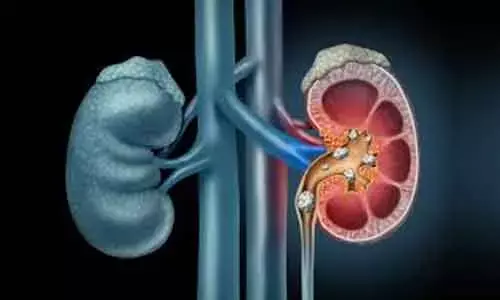- Home
- Medical news & Guidelines
- Anesthesiology
- Cardiology and CTVS
- Critical Care
- Dentistry
- Dermatology
- Diabetes and Endocrinology
- ENT
- Gastroenterology
- Medicine
- Nephrology
- Neurology
- Obstretics-Gynaecology
- Oncology
- Ophthalmology
- Orthopaedics
- Pediatrics-Neonatology
- Psychiatry
- Pulmonology
- Radiology
- Surgery
- Urology
- Laboratory Medicine
- Diet
- Nursing
- Paramedical
- Physiotherapy
- Health news
- Fact Check
- Bone Health Fact Check
- Brain Health Fact Check
- Cancer Related Fact Check
- Child Care Fact Check
- Dental and oral health fact check
- Diabetes and metabolic health fact check
- Diet and Nutrition Fact Check
- Eye and ENT Care Fact Check
- Fitness fact check
- Gut health fact check
- Heart health fact check
- Kidney health fact check
- Medical education fact check
- Men's health fact check
- Respiratory fact check
- Skin and hair care fact check
- Vaccine and Immunization fact check
- Women's health fact check
- AYUSH
- State News
- Andaman and Nicobar Islands
- Andhra Pradesh
- Arunachal Pradesh
- Assam
- Bihar
- Chandigarh
- Chattisgarh
- Dadra and Nagar Haveli
- Daman and Diu
- Delhi
- Goa
- Gujarat
- Haryana
- Himachal Pradesh
- Jammu & Kashmir
- Jharkhand
- Karnataka
- Kerala
- Ladakh
- Lakshadweep
- Madhya Pradesh
- Maharashtra
- Manipur
- Meghalaya
- Mizoram
- Nagaland
- Odisha
- Puducherry
- Punjab
- Rajasthan
- Sikkim
- Tamil Nadu
- Telangana
- Tripura
- Uttar Pradesh
- Uttrakhand
- West Bengal
- Medical Education
- Industry
Kidney stone: Type of endourologic procedure may not predict infectious complications

Iraq: The type of endourologic procedure used for the treatment of kidney stones is not associated with the infectious complication rates, says a new study published in Archives of Italian Urology and Andrology. The risk of infections may be reduced by the prevention of high intrarenal pressure during the procedure.
Endourological treatment is related to a risk of postoperative febrile urinary tract infections and sepsis. Rawa Bapir, Smart Health Tower, Sulaymaniyah, Kurdistan region, Iraq, and colleagues reviewed the reported rate of infectious complications in relation to the type and modality of the endourologic procedure.
The systematic review was conducted according to the PRISMA guidelines. The researchers searched two online databases (PubMed and EMBASE). 49 studies were included out of 243 articles after full-text evaluation.
Based on the study, the researchers reported the following findings:
- Random-effects meta-analysis demonstrated that retrograde intrarenal surgery (RIRS) and percutaneous nephrolithotomy (PCNL) were associated with not significantly different odds of getting fever (OR = 1.54) or sepsis (OR = 1.52).
- The odds of getting fever were not significantly different for mini PCNL compared to standard PCNL (OR = 1.11) and for tubeless PCNL compared to standard PCNL (OR = 1.34).
- The odds for fever after PCNL with suctioning sheath were lower than the corresponding odds for standard PCNL (OR = 0.37).
- The odds of getting fever after PCNL with perioperative prophylaxis were not different from the corresponding odds after PCNL with perioperative prophylaxis plus a short oral antibiotic course (before or after the procedure) (OR = 1.31).
"The type of endourological procedure used for kidney stone treatment does not appear to be decisive in the onset of infectious complications, although the prevention of high intrarenal pressure during the procedure could be critical in defining infectious complications risk," the authors concluded.
Reference:
Bapir, R., Bhatti, K. H., Eliwa, A., García-Perdomo, H. A., Gherabi, N., Hennessey, D., Mourmouris, P., Ouattara, A., Perletti, G., Philipraj, J., Trinchieri, A., & Buchholz, N. (2022). Infectious complications of endourological treatment of kidney stones: A meta-analysis of randomized clinical trials. Archivio Italiano Di Urologia E Andrologia, 94(1), 97-106. https://doi.org/10.4081/aiua.2022.1.97
Dr Kamal Kant Kohli-MBBS, DTCD- a chest specialist with more than 30 years of practice and a flair for writing clinical articles, Dr Kamal Kant Kohli joined Medical Dialogues as a Chief Editor of Medical News. Besides writing articles, as an editor, he proofreads and verifies all the medical content published on Medical Dialogues including those coming from journals, studies,medical conferences,guidelines etc. Email: drkohli@medicaldialogues.in. Contact no. 011-43720751


